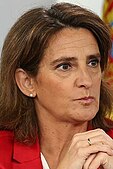2019 Cadisian special election (Pacifica)
| |||||||||||||||||||||
The 2019 Cadisian lspecial election, held in February, was held amid the resignation of Juan Solbes and a new government needed to be formed, where a Prime Minister would be elected.
Abiding by the Cadisian Constitution, for a special election, the leader of each major party are the nominees for their alliance. Additionally, other members can be candidates if nominated by a member of the Congress. The congressional members of that party need to officially approve their party leader before they can make the ballot.
Pedro Areces Garcia, of Valencia, who at the time, led the major opposition bloc, won the election over José Luis Escrivá, of Betis, the President of the Senate. Unai Sánchez-Vitoria, a member of the General Court from Valencia, served as the Independent Party candidate after the party failed to approve leader Teresa Calvo as their voice on the ballot.
Areces Garcia's win marked the first time that a member of the New Democratic Party was the head of state since 2011, after Isabel Cañete le+ft office. He focused his campaign on utilizing clean energy, expanding the economy, protecting Cadiz from climate threats, and polishing foreign relations.
Escrivá's loss was called a "failure to win" by his party and in the 2021 general election, he loss a primary race for re-election to the Senate.
Sánchez-Vitoria garnered the most votes an Independent candidate has ever gotten in Cadiz history. His success in this election paved a way for him to become the party's non-congressional leader, which prompted his resignation from Congress in 2020. He later became the Minister of Social Rights under Areces Garcia in 2022.
New Democratic Party
The New Democratic Party automatically nominated Pedro Areces Garcia, the leader of the liberal congressional bloc. Two other candidates were nominated, each of them members of the General Court.
Areces Garcia was the primary favorite, however, member of the General Court, Margarita Solaya, was nominated by a pro-union caucus citing Areces Garcia's previous opposition to labor unions. According to Solaya, her nomination was "unexpected" and "uncalled for." Solaya voted for Areces Garcia in the official tally, though raised concern about previous comments made by Garcia in regards to unionizing and labor rights.
José Alonso, a fellow General Court member, nominated himself. He was seen as a potential winner, and slight threat to Areces Garcia. Alonso cited his sixteen-year tenure as Mayor of Aguilon, a conservative-leaning city and his ability to win among both parties. Areces Garcia and Solaya later accused Alonso of meddling campaign funds, though a federal probe investigating it during the Areces Garcia executive administration found no wrongdoing. However, this attributed to Alonso's landslide loss and his political reputation. Three weeks before the primary election, Alonso withdrew from the race following low pollster ratings.
Candidates
Nominee
- Pedro Areces Garcia, Minority Leader of the Senate
Eliminated during vote
- Margarita Solaya, member of the General Court
- José Alonso, member of the General Court and former Mayor of Aguilon
| |||||||||||||
Popular Party
The Popular Party faced a turbulent nomination path. Seven candidates were nominated, all of whom supported a conservative outlook on Cadiz. Juan Solbes, the incumbent and outgoing Prime Minister, supported Ramón Aguirre, a member of the Senate and prominent businessman. Aguirre placed second in a nail-biting duel against Senate Majority Leader José Luis Escrivá.
Aguirre advocated for a more mainstream campaign, praising the popular Solbes administration. However, Escrivá decided to chart a more conservative route, calling for new leadership. Solbes, although popular during his first term, lost his largest stream of popularity following a 2019 oil investment controversy, which prompted his resignation.
Escrivá won the support of conservative activists and groups and garnered the support of Solbes' "flip-flopping" First Deputy Minister, Alberto Merino. Merino later criticized Escrivá and his failure to win, and announced his campaign to run in the June general election, moments before the filing deadline.




